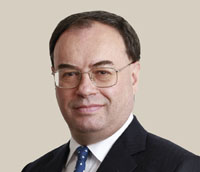Woodford fund suspension comes under regulatory investigation
Chris Hamblin, Editor, London, 19 June 2019

'We have opened an investigation but cannot comment any further.' This is the terse revelation that Andrew Bailey - the British Financial Conduct Authority's CEO and an odds-on favourite to become the next Governor of the Bank of England - has made about the Woodford fund suspension.
Bailey made his disclosure in the last sentence of a sprawling 1,600-word letter to Nicky Morgan MP, the chair of the Treasury Select Committee. This marks the moment at which, after a long time of speculation in the trade press, the Woodford fund failure finally became a formal regulatory matter.
Bailey was writing in response to a question from Ms Morgan about whether he was doing anything about the affair. It seems telling that he mentioned the fact that he was at last investigating the matter at the very end of the letter, the first half of which was devoted to background information.
On 6 June Ms Morgan commented on the news that dealing in the units of the LF Woodford Equity Income Fund had been suspended by saying: “Investors in the Woodford Fund have been locked out of accessing their cash. Yet it has been reported that Mr Woodford is taking in nearly £100,000 in management fees a day. The suspension of trading has provided Mr Woodford with some breathing room to fix his fund; he should afford his investors the same space and waive the fund’s fees while the fund is suspended. The FCA has rightly said that it is closely watching the fund. The Treasury Committee will no doubt raise this troubling episode, and what lessons can be learnt, when we take evidence from the FCA and Bank of England.”
The Financial Services and Markets Act 2000 does not oblige fund managers to reduce or waive their investment management fees during suspensions.
Questions from on high
She then sent Bailey a letter on 10 June which asked the following questions.
- What factors should dictate how long a suspension should be, and is there a maximum length? At what point would the FCA intervene in a suspension? Bailey replied that there was no formal time-frame for this but that one factor might be whether the fund could operate in an orderly fashion without disorderly sales. The fund manager in question, he added, must review the suspension formally at least every 28 days and inform the FCA of the results. The FCA has the power to tell a fund to suspend itself but only in certain circumstances (e.g. if the fund manager has broken the FCA's rules).
- Does the FCA have a view on the fees that funds charge during a suspension? Observing that "decisions around fee structures are for the fund manager to take," Bailey declined to answer.
- Is there a timeline of the FCA’s supervisory contact with the Fund, or those related to its management? The FCA has had most contact with Link Fund Solutions, which is the authorised fund manager in this case, and started talking to it in February of last year about risks pertaining to its liquidity. It heard that the firm had breached its self-imposed 10% limit on the maximum proportion of unlisted securities to be held in the LF Woodford Equity Income Fund. It then conducted "monitoring discussions" with Link in relation to the less and less liquid nature of the fund. Link took some action on this and reported no further breaches of the 10% limit. The fund became less and less liquid between June 2018 and April 2019. Among its holdings were securities listed on the International Stock Exchange (formerly the Channel Islands Stock Exchange) in Guernsey. On 11 April this year the exchange suspended dealings in three of them, which no doubt came as a blow to the fund.
- Is there a timeline of the FCA's supervisory contact with Guernsey about the fund? Bailey covered himself by saying that this was not the kind of thing of which the FCA expected to be notified, nor was it something that the exchange was obliged to divulge, nor was any fund manager legally obliged to tell its regulator that securities in its fund are to be listed. He went on to say that the exchange rang up the FCA to discuss matters on 15 April but contacted the wrong department. A phone call eventually occurred on 8 May.
During that month, net outflows averaged 1% of net asset value (NAV) per week but the redemption requests on 31st May and 3rd June amounted to £296 million, representing 8.2% of NAV, with the fund holding no cash at the time, having previously drawn down some of an overdraft facility. On 3rd June, Link decided that the fund could not meet the redemption requests and therefore suspended it.
Fallout
The Woodford saga has raised questions not only about the FCA's abilities as a regulator but also about the governance of funds in general. The CFA Society for the United Kingdom, which issues many of the Statements of Professional Standing (SPSes) which all retail investment advisors must obtain, is taking the opportunity to proclaim the need for 'professionalisation' - and therefore the need for bodies such as itself and the Chartered Institute for Securities & Investment - very loudly.
It has also emerged that Hargreaves Lansdown, the investment group, had misgivings about the fund as early as 2017. The Treasury Committee has today published the information in a letter from Chris Hill, the chief executive of Hargreaves Lansdown, to Nicky Morgan in response to her previous letter.
One ex-politician-turned-fund-manager who attended a PIMFA meeting in the capital today told Compliance Matters that the matter had only become a political hot potato "because politicians want it to be one." He thought that the furore was likely to end in the promulgation of new rules, adding that "no politician will ever defend the status quo."












